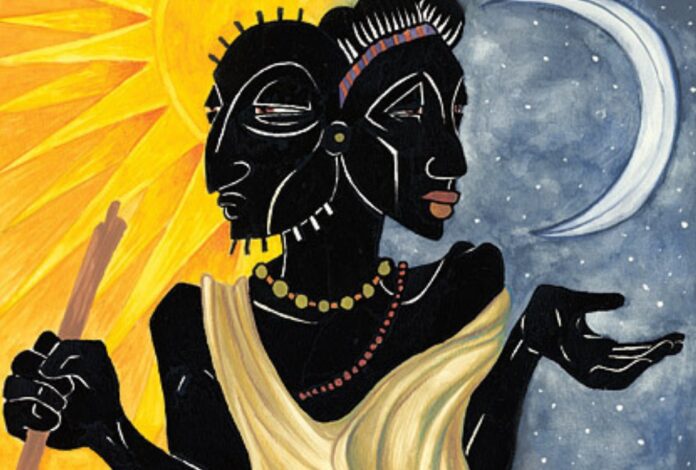Some of the popular African gods and goddesses include Oshun, Oya, Ala, Inkosazana, Amadioha, Kibuka, Adroa, Aja, Nana Aberewa, Mamlambo, Ogun, Tano, Modjadji, Shango, and Anyanwu.
Long before Africa was introduced to some of the well-known religions of today, like Christianity, Islam, Hinduism, etc., the continent and its inhabitants have always believed in the supernatural. These beliefs have been manifested in the concept of a deity that created and controlled the affairs of mankind.
It is noteworthy to point out that different nations and indigenous peoples have different names and symbols with which to identify their gods and goddesses, depending on who you ask. The list, which mostly includes deities from Africa’s most populous country Nigeria, far exceeds the measly fifteen listed at the beginning of this article, but we would, nonetheless, be focusing, in no particular order, on the aforementioned while exploring every aspect of their existence, including the tribe and country of origin.
Famous African Gods and Goddesses
1. Adroa
- Full name: Adroa
- Tribe of Origin: Lugbara Community
- Country: Uganda, Congo
Adroa is an African god who has his origins amongst the people of the Lugbara community in Uganda and Congo. This god has several characteristics. He is often described as the creator, but he is also the god of death.
Adroa has a split personality which is rightfully manifested in his unique appearance, which consists of one half being short and black and the other being tall and white. The short and black aspect of his anatomy symbolizes his evil personality while the tall and white part of his physique characterizes the aspect of his personality, which is believed to be good and evil.
The Lugbara people also yield to the myth that Adroa manifests himself to people depending on the situation at hand and that he also appears to individuals before they die. Adroa is still actively worshiped by people in this region because of their strong adherence to traditional beliefs and refusal to be swayed by Western influence.
2. Inkosazana
- Full name: Inkosazana
- Tribe of Origin: Zulu
- Country: South Africa
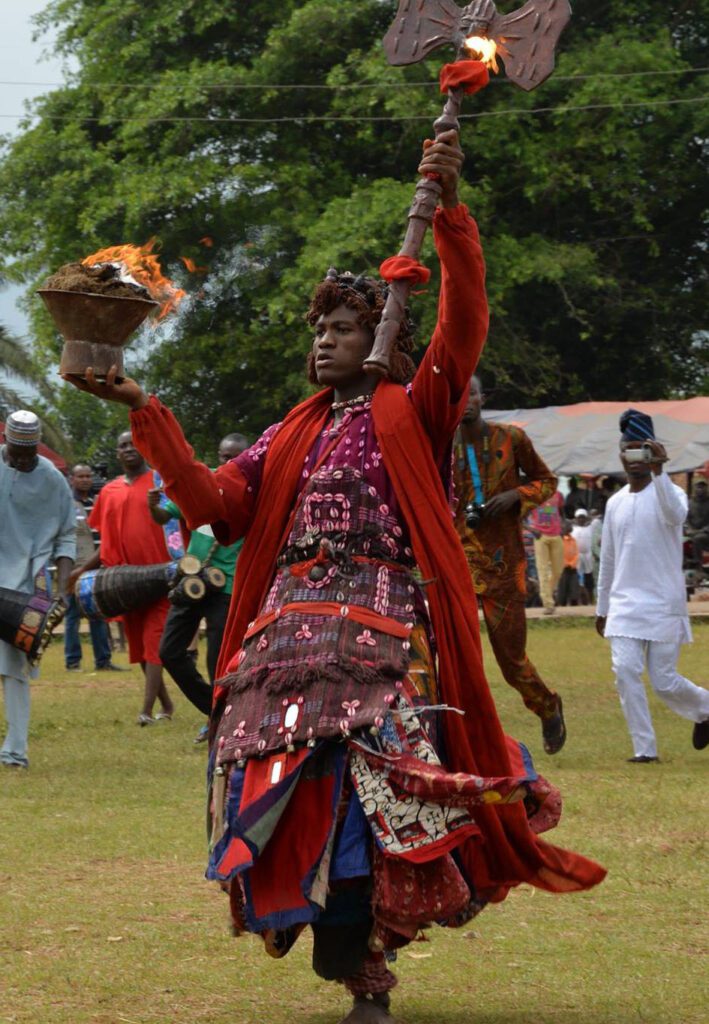
Inkosazana, which means Lady Heaven, is the South African goddess of agriculture and fertility. Her influence and relevance are prominent among the Zulu people who revere her as the Mermaid. That term primarily stems from the fact that she is said to live in water.
She is also believed to be a shapeshifter who can embody several physical forms without detection. Zulus also believe in her ability to protect the young and old and is particularly drawn to issues regarding virgins, which speaks to another aspect of her character as being mainly pure of heart.
Amongst other things, many Zulus place the responsibility for corn, one of the essential food supplements of the Zulu tribe, at the feet of Inkosazana. All accounts of the existence of the goddess signify the fact that several South Africans, particularly Zulus, still make sacrifices of worship and pay homage to the goddess.
3. Oshun
- Full name: Oshun, Osun
- Tribe Origin: Yoruba
- Country: Nigeria
Oshun is one of the most revered goddesses in Nigeria, Africa’s most populous nation. She has her origin in the Yoruba tribe and represents several virtues, including as the goddess of sweet and fresh waters, which is further illustrated by the fact that she is the patron of the Osun River in Nigeria.
Osun is the wife of Shango and is also revered for other abilities, including as the goddess of fertility, prosperity, and the ability to heal the sick. Despite the introduction of various other religions like Christianity and Islam among the Yoruba people of the country, Oshun is still actively worshiped amongst several Yorubas.
4. Ala
- Full name: Ala
- Tribe Origin: Igbo
- Country: Nigeria
Ala, translated as the earth in English, is another popular deity in Nigeria, and she has her origins in Igbo land. The Igbo tribe is one of the three major ethnic groups in Nigeria, and the goddess Ala is one of the oldest goddesses in the tribe. She is the goddess of fertility, creativity, land, and morality.
The Igbo believe that Ala (earth), as her name symbolizes, has power over the planet and can control the activities of everyone and everything in it. Also, her considerable influence and power are further fortified by the fact that she is the wife of Amadioha, one of the tribe’s most ferocious gods.
It is believed that when she is provoked, she can influence her husband to withhold rain from the earth, a phenomenon that often leads to natural disasters and other calamities. Like most of the gods and goddesses in Africa, Ala’s influence in her domain has waned considerably because of the introduction of Christianity and other religions.
She is, nonetheless, still worshiped among staunch traditionalists who honor and celebrate her during annual ceremonies like new yam festivals.
5. Nana Aberewa
- Full name: Nana Aberewa
- Tribe of Origin: Ashanti
- Country: Ghana
We return to the West African region of Africa, this time to Ghana, to tell you of the goddess Nana Aberewa. She is the goddess of war, fertility, protection, and prosperity, who originated amongst the Ashanti people of the country.
Sources claim that she was a historical queen who ruled the nation in the 17th century and was pivotal to the forging of the history of the Ashanti people. She was deified upon death and has since been revered as a goddess by people in that region for her uncharacteristic leadership and courage on the field of battle.
She retains active status among the Ashanti people who still practice traditional forms of worship.
6. Shango
- Full name: Shango, Sango
- Tribe Origin: Yoruba
- Country: Nigeria
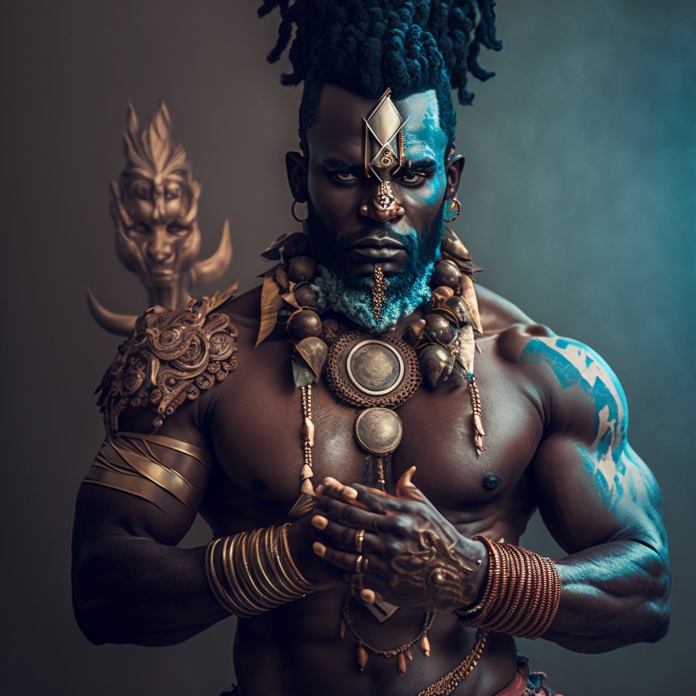
Shango is another powerful deity in Yorubaland, an ethnic group in Nigeria. He is primarily known as the god of thunder, often represented as a double-headed-ax-wielding deity who strikes down offenders with thunder and lightning. However, he is also the god of vengeance, social order, and protection.
Before he was deified, Shango was considered one of the most powerful kings the Yoruba tribe had ever produced, and in that time, he had three wives, including Oshun (Osun), who was considered to be his favorite. Every sign and representation of the god points to the fact that he retained his fearsome and ferocious reputation as a god.
He is still one of the most active and worshiped gods among not just the Yoruba people but amongst several African tribes, most of whom consider him the most powerful deity in Africa. Not surprisingly, his influence continues to dissipate because of religions like Christianity and Islam.
7. Amadioha
- Full name: Amadioha, Amadiora
- Tribe Origin: Igbo
- Country: Nigeria
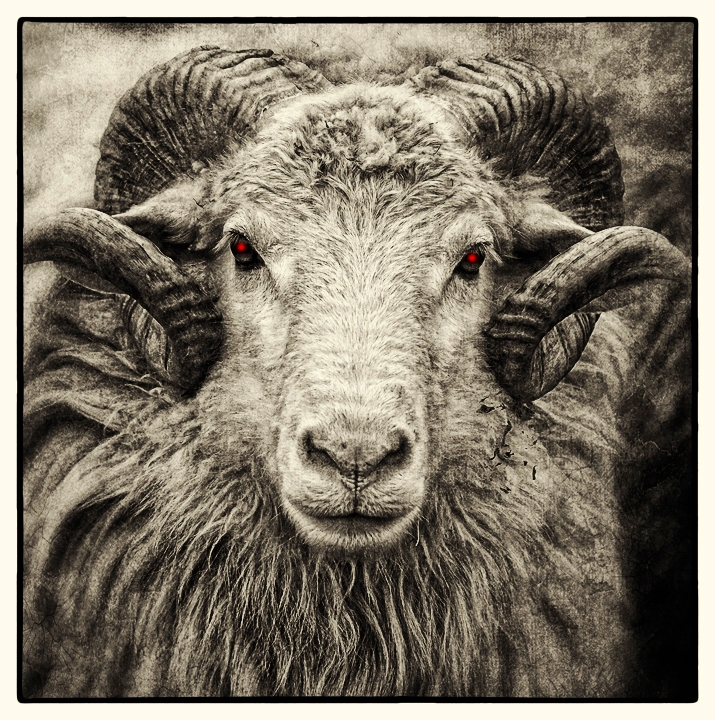
Amadioha, or Amadiora to some, is to the Igbos what Shango (Sango) is to the Yorubas. While both deities share a lot of similarities, they also differ in several ways. A case in point is the fact that, like Shango, Amadioha is also the god of thunder and justice and is revered by Igbos in the same way Yorubas revere Shango as the foremost and most powerful deity.
According to several sources, Amadioha’s name is used to solidify oaths in Igboland and often carries the death penalty when those oaths are broken. Like Shango, Amadioha is also believed to be married to the goddess of fertility, in this case, Ala. Unlike Shango, who is unapologetically violent and devoid of any form of charitable emotion, Amadioha is also considered the god of love, peace, and unity.
He also differs from Shango and other gods of thunder in the sense that he never manifested as human and does not carry any object of power like Shango’s double-headed ax. His representation of a white ram is validated by several sources who claim that he sometimes appears to his people in the form of a large white ram.
Despite religious advancements and changes, Amadioha remains one of the most popular deities in Igboland.
8. Kibuka
- Full name: Kibuka
- Tribe of Origin: Bantu people of the Buganda Empire
- Country: Uganda
Kibuka is the god of war indigenous to the people of the Buganda empire, a Bantu kingdom in the East African country of Uganda. The myth surrounding his existence states that he has been with the Buganda people since the 9th century, long before the arrival of the Europeans in the country.
The myth goes on to say that Kibuka was the brother of the creator Mukasa to whom the Bugandan king went for help after the empire’s military had experienced several defeats at the hands of its enemies.
Mukasa’s response was to send his younger brother Kibuka to be their god of war, and before any battle, the army would sing, dance, and offer sacrifices to Kibuka, who would, in turn, pave the way to victory.
It is important to note though, that before becoming the Buganda god of war, Mukasa counseled his brother to operate from a secluded place in the clouds, a position from which the latter rained down arrows on Buganda’s enemies.
He was also warned not to get involved with women from enemy camps. However, his failure to heed this warning ultimately led to his demise. The myth around this supposed death is centered around a slave woman who Kibuka took to his hut after one battle and who later escaped after uncovering the god’s identity to inform her people of his whereabouts.
During the next battle, they reportedly aimed their bows and arrows at Kibuka’s location to shoot and subsequently kill him. If the sources regarding this aspect of Kibuka’s existence are to be believed, it most certainly informs the consensus that Kibuka is no longer active as a god among the Buganda people.
9. Oya
- Full name: Oya, Oia
- Tribe Origin: Yoruba
- Country: Nigeria
Oya (Oia) is the Yoruba goddess of rain, wind, lightning, and storms. She is also revered as a goddess of fertility, death, and rebirth. Her reputation was forged on the back of beliefs that she is the bringer of life-giving rain, protector of crops, and a guide for souls of the dead to the afterlife.
Oya, like several Yoruba gods and goddesses, started as a human. She was said to have been one of the wives of Shango when he was a living king. Some even believe that she, and not Oshun, was the king/deity’s favorite wife. She was also a powerful warrior queen who was revered for her courage and bravery in battle.
As a goddess, Oya maintains her identity as a powerful entity who often accompanies her husband on his rampaging incursions with her wind which often ignites a fire. Oya is represented as a warrior with a sword or machete in her right hand and a fan in her left hand.
The sword is used to cut down obstacles in her path to bring about change, an important aspect of her power, while the fan is used to control winds and create storms. Oya, like most gods and goddesses, has a good and bad side but is nonetheless still worshiped amongst some Yoruba tribes as well as in other parts of Africa and the world, despite the changes instituted by some of the world’s known religions.
10. Mamlambo
- Full name: Mamlambo
- Tribe of Origin: Zulu
- Country: South Africa
Mamlambo is the South African goddess of rivers with primary origins amongst the people of the Zulu tribe. This goddess often takes the form of a large serpent or a large dragon and is believed to live in various bodies of water like streams, rivers, and oceans.
Mamlambo, like several gods and goddesses, African or not, typically showcases a dual personality of good and evil. The good part is often benevolent and kind towards its followers, while the evil part is unleashed on offenders or evil doers.
She is especially protective of women and children, probably considering their often weak and frail nature, but she has been known to prey on a few of these women and children when she is angered. She often causes chaos by whipping up powerful floods geared toward destruction.
Mamlambo remains a revered deity amongst several members of the Zulu tribe who continue to render acts of service and worship to her.
11. Tano
- Full name: Tano, Ta Kora, Tano Kora
- Tribe of Origin: Asante, Agni
- Country: Ghana, Ivory Coast
Tano (full name: Ta Kora, also known as Tano Kora) is a river god indigenous to the Asante people of Ghana and the Agni people of Ivory Coast, both of who practice the Akan religion, which comprises traditional and religious beliefs which espouse the idea of a senior god who generally does not interact with humans and a bunch of other gods who assist this god as well as humans.
In Akan mythology, Tano is a god of war and strife, in addition to being a god of the river. He is one of the strongest deities in Asante mythology, with several abilities, which include healing, destruction, and protection.
This deity is represented by the Tano River, a river in Ghana that flows for 400 kilometers from a town called Traa, a suburb of Techiman, the capital town of Bono East Region, to Ehy Lagoon, Tendo Lagoon, and ultimately Aby Lagoon in Ivory Coast.
His physical form is depicted as that of a big and strong warrior armed with a sword with two blades as well as a legendary but mythical gun known as Kodiawuo, literally translated as Go eat and die or, more loosely, as Pandemic.
Tano generally protects his followers but is also known to ruthlessly punish any of those followers who step out of line. His reputation has always been that of a war god, but many believe that he is a more peaceful deity these days.
Despite the advent of Christianity and the like, there are still a lot of people in this god’s sphere of influence who continue to render services of worship to him, a fact that indicates that he is still quite active even though he may not be as influential.
12. Anyanwu
- Full Name: Anyanwu
- Tribe Origin: Igbo
- Country: Nigeria
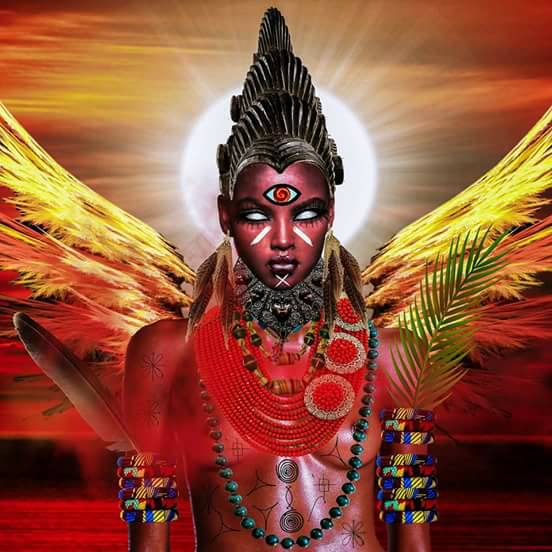
Literally translated as eye of the Sun in English, the goddess Anyanwu is another revered goddess among the Igbo people, who are mainly situated in the South Eastern part of the African nation, Nigeria. However, several sources indicate that she has fallen into oblivion as one of the forgotten deities in the region.
However, it must be reiterated that this goddess, who was the goddess of the sun and natural life, was revered to the point that some families adopted her name as their surname in honor of her prime attributes. Igbo worshippers of the deity believe that Amadioha’s penchant for violence is tempered by Anyanwu’s predisposition to bring natural life.
As previously indicated, Anyanwu relevance amongst most of the people of the region has considerably dissipated, in large part due to the advent of Western and Arabic religious influences. There is, however, still a clutch of traditional worshipers in some rural areas in Igboland who continue to perform acts of worship to the goddess.
13. Ogun
- Full name: Ogun, Ogoun
- Tribe Origin: Yoruba
- Country: Nigeria
Another popular, respected, and feared deity in Yorubaland is the god Ogun. There are several myths and legends surrounding the emergence and existence of this deity, but the prime consensus remains the fact that he is the god of iron and war, as well as the fact that he was one of the earliest gods to come to the earth.
Ogun is often misunderstood because of his creative nature, which seems to go hand in hand with his equally destructive nature, which is mostly triggered by his quick and fiery temper. Ogun’s reputation as the god of iron stems from the fact that he used his connection with the element iron to fashion a tool that he used to create a pathway for the rest of the gods who came to the earth after him.
Other aspects of the myth surrounding this deity have to do with his lifestyle when he arrived on Earth. He was said to have lived a secluded life at the top of a hill from whence he went hunting, which many believe to be his favorite pastime. When he eventually got bored of that existence, he reportedly descended in search of a more settled life.
Unable to find what he was looking for in any of the first communities where he first stopped, he borrowed some fronds from a palm tree and moved to Ire, where he was eventually made king, a myth depicted in one of his many titles Ogun Onire (Ogun, the Lord of Ire).
Ogun’s colors are red, green, and black and are often represented by iron, dogs, and palm fronds. This deity is still one of the most active and worshiped deities in Africa, especially in Nigeria, where the Yorubas in states like Ondo honor him annually with festivals like the Ogun festival, which is celebrated annually between August and September.
14. Modjadji
- Full name: Queen Modjadji
- Tribe of Origin: Balobedu
- Country: South African
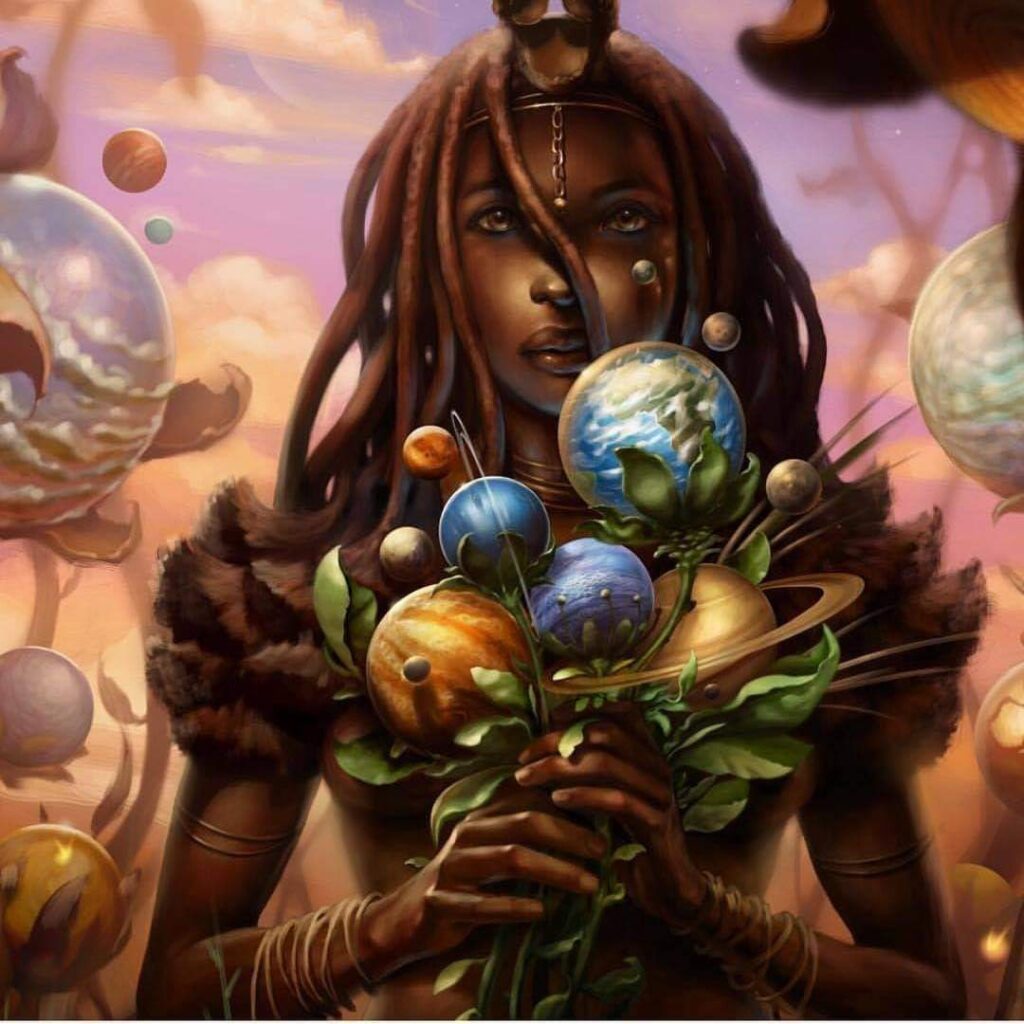
Modjadji, or Queen Modjadji, is the South African goddess of rain who is said to have begun inhabiting the body of a woman in the 16th century. The woman in question has since been considered the queen of Balobedu or the rain queen, as the people call her.
One of her many abilities includes the ability to control clouds, floods, and rainfall. Several myths surround the existence of this goddess, one of which includes the story about an old chief in the 16th century who was instructed to impregnate his daughter, Dzugundini, by his ancestors. They convinced him that she would acquire rain-making skills in the process.
Another version of the myth tells the story of a man named Mokoto who had the vision to marry his daughter to create a matrilineal dynasty. The story essentially concludes with the fact that their marriage led to the first rain queen known as Modjadji, translated as ruler of the day.
Modjadji is still an active goddess in the hearts and minds of some of the Balobedu people, and they continue to show their faith in her through several acts of worship.
15. Aja
- Full name: Aja
- Tribe of Origin: Yoruba
- Country: Nigeria
Aja is the Yoruba goddess of the forest because of her ability to provide protection for the forest and the creatures that inhabit it. Literally translated as Wild Wind, Aja is also considered a goddess of the earth and healing because of her ability to heal the sick with herbs.
Her relevance in today’s world is still quite strong because of her link to trees which many of her more enlightened worshippers believe are the only things protecting humanity from the already harsh effects of a rapidly changing climate. Aja, as a deity, is often portrayed as a powerful and fierce warrior deity with her regalia of animal skins and weapons.
Part of the myth surrounding her existence is also deeply rooted in the belief that she is the mother of the deities Ogun and Oya, both of whom are associated with iron and wind, respectively. As earlier stated, Aja is still a deity that certain Yorubas still offer sacrifices of worship.
